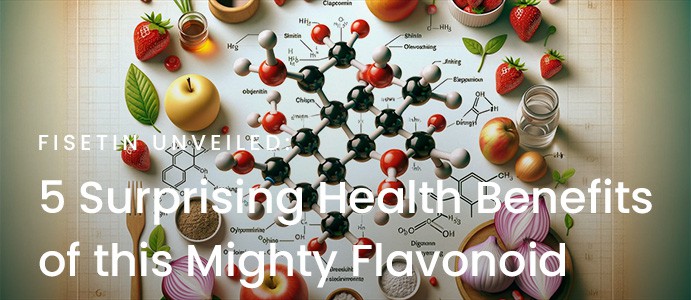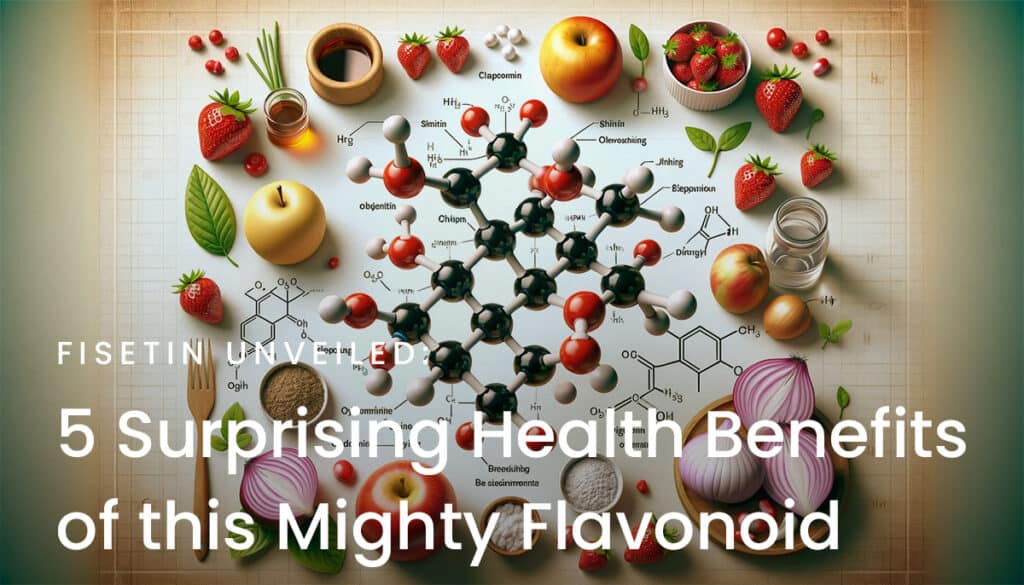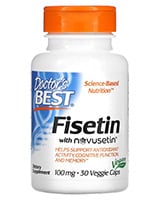

Introduction
Fisetin, a naturally occurring flavonoid found in various fruits and vegetables, has recently garnered attention for its impressive range of health benefits. This bioactive compound, present in strawberries, apples, and grapes, among others, is not just another nutrient in our diet but a potent molecule with multiple health-promoting properties. This article delves into the top five health benefits of Fisetin, unveiling its potential to revolutionize our approach to health and wellness.
Fisetin as a Potent Anti-Aging Agent
One of the most striking benefits of Fisetin is its anti-aging properties. Research indicates that this flavonoid plays a significant role in enhancing cellular health and longevity[1]Yousefzadeh, M. J., Zhu, Y., McGowan, S. J., Angelini, L., Fuhrmann-Stroissnigg, H., Xu, M., … & Niedernhofer, L. J. (2018). Fisetin is a senotherapeutic that extends health and lifespan. EBioMedicine, 36, 18-28. https://doi.org/10.1016/j.ebiom.2018.09.015. It achieves this by targeting and eliminating senescent cells – the cells that have stopped dividing and contribute to aging and age-related diseases. Studies have shown that Fisetin not only helps clear these cells but also reduces the markers of aging, thereby potentially extending the lifespan and improving the overall quality of life.
In animal models, Fisetin supplementation has demonstrated an ability to increase lifespan by as much as 10%. This effect is attributed to its senolytic activity, meaning it selectively induces the death of senescent cells. By reducing the burden of these dysfunctional cells, Fisetin helps in alleviating various age-related conditions, such as frailty, osteoporosis, and cardiovascular diseases. Notably, ongoing research, including clinical trials, is exploring the possibility of replicating these effects in humans, positioning Fisetin as a promising agent in the fight against aging.
Neuroprotective Effects and Cognitive Enhancement
Fisetin’s influence extends significantly to brain health, where it serves as a powerful neuroprotective agent. Studies have illustrated that this flavonoid enhances cognitive functions, including memory and learning[2]Ding, H., Li, Y., Chen, S., Wen, Y., Zhang, S., Luo, E., … & Zeng, H. (2022). Fisetin ameliorates cognitive impairment by activating mitophagy and suppressing neuroinflammation in rats with sepsis‐associated encephalopathy. CNS Neuroscience & Therapeutics, 28(2), 247-258. https://doi.org/10.1111/cns.13765. Its neurotrophic properties facilitate the growth and maintenance of neurons, essential for healthy brain function. In the context of neurodegenerative diseases such as Alzheimer’s, Fisetin has shown promising results. It aids in reducing cognitive deficits and improving synaptic functions, which are vital for memory and learning. Research involving animal models of Alzheimer’s disease revealed that Fisetin supplementation could help reverse synaptic dysfunction and decrease oxidative stress and inflammation in the brain, all of which are factors contributing to Alzheimer’s and other forms of dementia.
Furthermore, Fisetin’s role in enhancing long-term potentiation, a process critical for the formation and retention of memory, underlines its potential as a cognitive enhancer. By protecting neurons from damage due to oxidative stress and supporting brain cell signalling, Fisetin emerges as a key component in maintaining cognitive health, especially with advancing age.
Anti-Inflammatory and Antioxidant Properties
The anti-inflammatory and antioxidant capabilities of Fisetin are among its most notable health benefits. Chronic inflammation and oxidative stress are underlying factors in many diseases, and Fisetin’s ability to combat these processes is significant. By boosting levels of glutathione – the body’s primary antioxidant – Fisetin helps protect cells from oxidative damage. It also suppresses the expression of pro-inflammatory genes and enzymes like tumour necrosis factor-alpha (TNF-α) and interleukin-1β, thereby mitigating inflammation.
Studies have demonstrated that Fisetin can protect against various forms of cellular stress[3]Grynkiewicz, G., & Demchuk, O. M. (2019). New perspectives for fisetin. Frontiers in Chemistry, 7, 697. https://doi.org/10.3389/fchem.2019.00697, reducing the risk of chronic diseases and promoting overall health. This dual action of being both an antioxidant and an anti-inflammatory agent makes Fisetin a powerful compound for protecting against a wide range of health issues, from minor ailments to chronic conditions.
Cancer Prevention and Therapeutic Potential
Fisetin’s role in cancer prevention and therapy is another area of growing interest. Research has revealed that Fisetin possesses anticarcinogenic properties[4]Imran, M., Saeed, F., Gilani, S. A., Shariati, M. A., Imran, A., Afzaal, M., … & Anjum, F. M. (2021). Fisetin: An anticancer perspective. Food Science & Nutrition, 9(1), 316. https://doi.org/10.1002/fsn3.1872, potentially inhibiting tumour growth and aiding in cancer therapy. Its mechanisms include the induction of apoptosis (programmed cell death) in cancer cells and the inhibition of angiogenesis, the process by which new blood vessels form to supply nutrients to tumours. Additionally, Fisetin has been observed to reduce the proliferation of various cancer cell lines, making it a promising adjunct in cancer treatment strategies.
In animal studies, Fisetin has shown effectiveness in reducing the formation of new blood vessels in various forms of cancer, essentially starving tumour cells of the oxygen and nutrients they require to grow. This ability to act both as a chemopreventive and a therapeutic agent against cancer highlights Fisetin’s versatile potential in oncology.
Fisetin’s Role in Cardiovascular Health
Fisetin extends its health benefits to the cardiovascular system as well. It has shown promise in improving heart health by influencing blood flow and cholesterol levels. Fisetin’s antioxidant properties play a crucial role here, protecting the cardiovascular system from oxidative stress and inflammation, which are significant contributors to heart disease.
Studies indicate that Fisetin can improve endothelial function[5]Mahoney, S. A., Venkatasubramanian, R., Darrah, M. A., Ludwig, K. R., VanDongen, N. S., Greenberg, N. T., … & Clayton, Z. S. (2023). Intermittent supplementation with fisetin improves arterial function in old mice by decreasing cellular senescence. Aging Cell, e14060. https://doi.org/10.1111/acel.14060, which is vital for maintaining the health of blood vessels. Additionally, its anti-inflammatory action helps in reducing the risk of atherosclerosis, a major cause of heart attacks and strokes. By maintaining vascular health and preventing the build-up of plaque in arteries, Fisetin contributes to a stronger, healthier cardiovascular system.
Conclusion
Fisetin, a mighty flavonoid, has emerged as a multi-faceted compound offering a range of health benefits. From its potent anti-aging properties and neuroprotective effects to its roles in cancer prevention and cardiovascular health, Fisetin stands out as a remarkable natural compound with significant therapeutic potential. While more research is needed to fully understand its mechanisms and optimize its use in clinical settings, the current evidence points to Fisetin as a valuable addition to health and wellness regimens. As we continue to explore the depths of natural compounds in promoting health, Fisetin is undoubtedly a compound to watch, offering hope for a healthier, longer life.
Buy Fisetin Online Review Comparison Table
 Fisetin with Novusetin | iHerb | 30 pills (100mg) | $16.79 |  Worldwide, AU | Visit Website >> |
References
| ↑1 | Yousefzadeh, M. J., Zhu, Y., McGowan, S. J., Angelini, L., Fuhrmann-Stroissnigg, H., Xu, M., … & Niedernhofer, L. J. (2018). Fisetin is a senotherapeutic that extends health and lifespan. EBioMedicine, 36, 18-28. https://doi.org/10.1016/j.ebiom.2018.09.015 |
|---|---|
| ↑2 | Ding, H., Li, Y., Chen, S., Wen, Y., Zhang, S., Luo, E., … & Zeng, H. (2022). Fisetin ameliorates cognitive impairment by activating mitophagy and suppressing neuroinflammation in rats with sepsis‐associated encephalopathy. CNS Neuroscience & Therapeutics, 28(2), 247-258. https://doi.org/10.1111/cns.13765 |
| ↑3 | Grynkiewicz, G., & Demchuk, O. M. (2019). New perspectives for fisetin. Frontiers in Chemistry, 7, 697. https://doi.org/10.3389/fchem.2019.00697 |
| ↑4 | Imran, M., Saeed, F., Gilani, S. A., Shariati, M. A., Imran, A., Afzaal, M., … & Anjum, F. M. (2021). Fisetin: An anticancer perspective. Food Science & Nutrition, 9(1), 316. https://doi.org/10.1002/fsn3.1872 |
| ↑5 | Mahoney, S. A., Venkatasubramanian, R., Darrah, M. A., Ludwig, K. R., VanDongen, N. S., Greenberg, N. T., … & Clayton, Z. S. (2023). Intermittent supplementation with fisetin improves arterial function in old mice by decreasing cellular senescence. Aging Cell, e14060. https://doi.org/10.1111/acel.14060 |

Leave a Reply